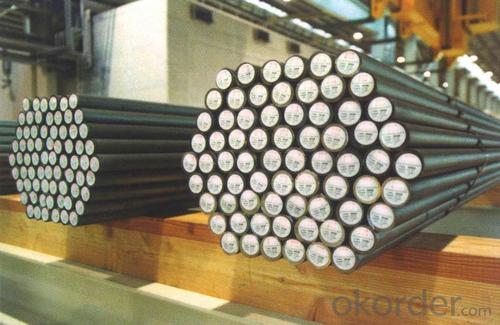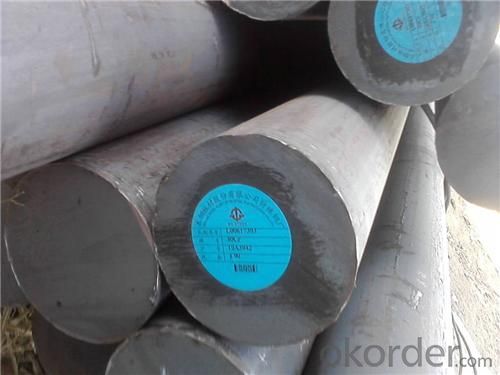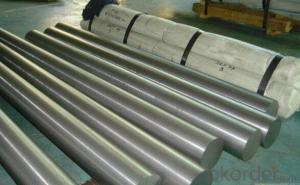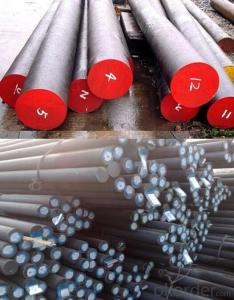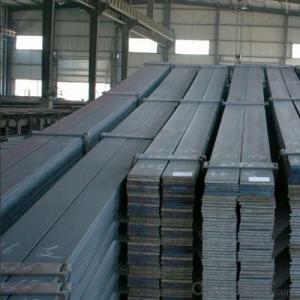Alloy Steel Cr40,Steel Material,40cr Steel Specification
- Loading Port:
- China main port
- Payment Terms:
- TT or LC
- Min Order Qty:
- 30 m.t.
- Supply Capability:
- 10000 m.t./month
OKorder Service Pledge
OKorder Financial Service
You Might Also Like
Specification
Alloy Steel Cr40,Steel Material,40cr Steel Specification
Product information:
| Alloy Steel Cr40,Steel Material,40cr Steel Specification | |||||||||
| 1.Specifications of 40Cr Steel | |||||||||
| Round bar | Diameter(mm) | Length (mm) | |||||||
| 20~800 | 3000~5800 | ||||||||
| Plate | Thickness(mm) | Width (mm) | Length (mm) | ||||||
| Max:800 | 205~800 | 2000~4000 | |||||||
| The specification can be customized. | |||||||||
| 2.Chemical compositon(%) of 40Cr Steel | |||||||||
| Standard | C | Mn | Si | Cr | Mo | P | S | ||
| Number | Ni | ||||||||
| GB | 42CrMo | 0.38~0.45 | 0.50~0.8 | 0.17~0.37 | 0.9~1.2 | 0.15~0.25 | ≤0.035 | ≤0.035 | ≤0.3 |
| AISI | 4140 | 0.40~0.45 | 0.75~1.0 | 0.15~0.35 | 0.8~1.1 | 0.15~0.25 | ≤0.035 | ≤0.040 | |
| JIS | SCM440 | 0.38~0.43 | 0.60~0.9 | 0.15~0.35 | 0.9~1.2 | 0.15~0.30 | ≤0.030 | ≤0.030 | ≤0.25 |
| EN (DIN) | 1.7225 | 0.38~0.45 | 0.60~0.9 | ≤0.40 | 0.9~1.2 | 0.15~0.30 | ≤0.025 | ≤0.035 | |
| 4.Heat treatment of 40Cr Steel | |||||||||
| Forging:1100~900°C | |||||||||
| Normalization:860~880°C | |||||||||
| Subcritical annealing:680~720°C | |||||||||
| Isothermal annealing:830~900 670x3h°C | |||||||||
| Hardening:830~860 oil | |||||||||
| Tempering:550~650°C | |||||||||
| 5.Machanical Properties | |||||||||
| Tensile str. (N/mm2):1080 | |||||||||
| Yield point (N/mm2):930 | |||||||||
| Elongation (%):12 | |||||||||
| Contraction (%):45 | |||||||||
| Impack work (J/cm2):63 | |||||||||
| Hardness (HB):217 | |||||||||
| 5.Characteristic of 40Cr Steel | |||||||||
| Chromium molybdenum high tensile steel with yield strength of 550N/mm2. | |||||||||
| Chromium renders steel oil hardenable and increase hardenability. | |||||||||
| Weldability suffers with increasing chromium content. | |||||||||
| High temperature strength and high pressure hydrogenation properties are | |||||||||
| promoted by chromium and molybdenum. | |||||||||
| Molybdenum significantly reduces temper brittleness. | |||||||||
Product show
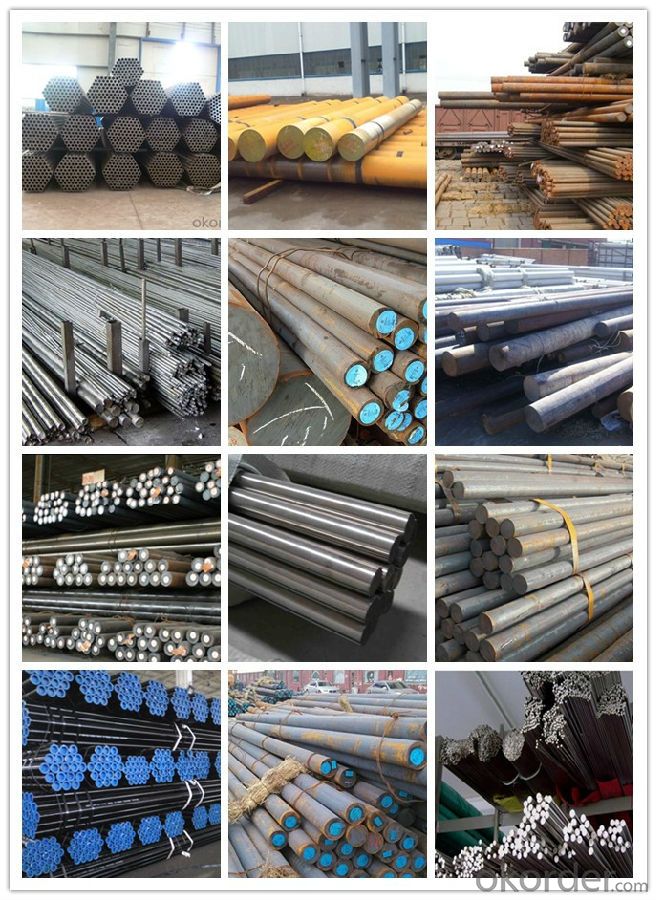
Workshop show
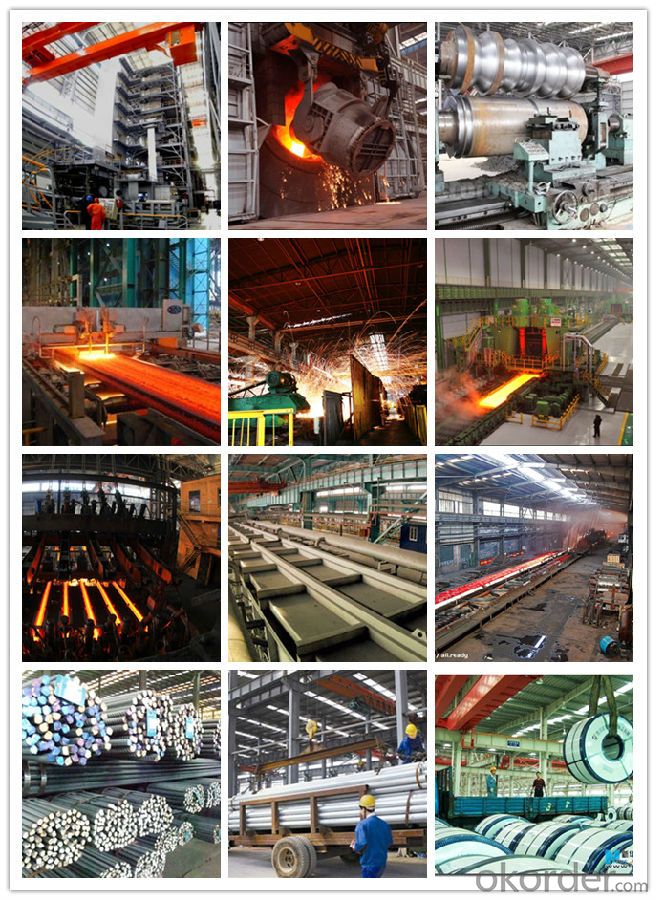
Our service:
-High manufacturing accuracy
-High strength
-Small inertia resistance
-Strong heat dissipation ability
-Good visual effect
-Reasonable price
Chose happens because of quality, then price, We can give you both.Additionally, we can also offer professional products inquiry, products knowledge train(for agents), smooth goods delivery, exellent customer solution proposals.Our service formula: good quality+good price+good service=customer's trust
SGS test is available, customer inspection before shipping is welcome, third party inspection is no problem.
40Cr steel, is a high quality alloy structural steel. The main components are 0.37-0.44 Si 0.17-0.37 Mn 0.50-0.80 Cr 0.80-1.10 C.
40Cr steel is used as a mechanical part and a variety of engineering components and contains one or more of the alloy elements of a certain amount of steel.This kind of steel is suitable for the heat treatment of metal, and the microstructure is uniform, bainite, or very fine pearlite after heat treatment.
So the 40Cr steel with wear consumption, chemical corrosion resistance, tensile strength, high elasticity, high pressure load, wear-resistant high strength, ceiling shock resistance, tear resistance, radiation resistance, high load and shock absorption, good performance.
Import of 40 Cr steel has better elastic recovery performance and better hardness and toughness, wear resistance, machinability is superior.
Used in metallurgy, mines, petroleum, automobile, building materials, sports, heavy machinery, large stamping equipment shock absorbing cushion, cushion block, a spring and a metal plate, pipe punching material mold, general machinery and equipment and other accessories cushion or damping effect is ideal material for mould spring.
- Q: How does special steel perform in stamping applications?
- The unique properties of special steel make it an excellent choice for stamping applications. Its high strength and durability ensure that it can withstand wear and tear during the stamping process, resulting in longer tool life and reduced maintenance costs. Additionally, special steel's heat resistance allows it to maintain its structural integrity even at high temperatures, preventing warping or deformation. Its exceptional dimensional stability ensures precise and consistent results, while its excellent formability allows for the creation of intricate designs. Overall, special steel's properties make it a reliable and versatile option for a wide range of stamping applications.
- Q: How is special steel used in the manufacturing of bearings?
- Special steel is used in the manufacturing of bearings due to its high strength, durability, and resistance to wear and corrosion. This type of steel is specifically designed to withstand the demanding conditions and loads that bearings are subjected to. It is used to create the inner and outer rings, as well as the rolling elements, of the bearing, ensuring smooth operation and increased lifespan.
- Q: What are the different methods of machining special steel?
- There are several different methods of machining special steel, each with its own advantages and applications. Some of the most common methods include: 1. Turning: Turning is a machining process that involves rotating a workpiece while a cutting tool removes material from the surface. This method is typically used to create cylindrical shapes and can produce high-quality finishes. 2. Milling: Milling is a versatile machining method that uses rotary cutters to remove material from a workpiece. It can be used to create complex shapes and contours, and is often employed in the production of special steel components. 3. Drilling: Drilling is a machining process that involves creating holes in a workpiece using a rotating cutting tool. It can be used to create both through holes and blind holes in special steel, and is commonly used in various industries. 4. Grinding: Grinding is a precision machining method that uses an abrasive wheel to remove material from a workpiece's surface. It is often used to achieve tight tolerances and smooth finishes on special steel components. 5. Broaching: Broaching is a machining process that uses a sharp cutting tool with multiple teeth to remove material in a series of linear cuts. It is commonly used to create keyways, splines, and other intricate shapes in special steel. 6. Electrical Discharge Machining (EDM): EDM is a non-traditional machining method that uses electrical discharges to remove material from a workpiece. It is particularly useful for machining special steel with complex shapes or for creating small features. 7. Laser Cutting: Laser cutting utilizes a high-powered laser to cut through special steel with extreme precision. It is commonly used for intricate designs and can produce smooth edges without the need for subsequent processing. Each of these methods has its own advantages and limitations, and the choice of machining method depends on factors such as the desired outcome, the complexity of the part, and the properties of the special steel being machined.
- Q: How is corrosion-resistant alloy steel used in the production of chemical processing equipment?
- Corrosion-resistant alloy steel is used in the production of chemical processing equipment due to its ability to withstand the harsh chemical environments and resist corrosion. It is commonly used to manufacture pipes, tanks, valves, and other components that come into contact with corrosive substances. This type of steel helps ensure the longevity and reliability of the equipment, preventing leaks, contamination, and costly repairs or replacements.
- Q: What are the requirements for special steel used in oil and gas equipment manufacturing?
- The requirements for special steel used in oil and gas equipment manufacturing are quite stringent due to the demanding operating conditions and harsh environments that these materials will be exposed to. Some of the key requirements include: 1. Corrosion Resistance: Special steel used in oil and gas equipment must have excellent resistance to corrosion, especially in the presence of various corrosive fluids such as oil, gas, and saltwater. This helps to prevent degradation and premature failure of the equipment. 2. High Strength: The steel must possess high strength and toughness to withstand the extreme pressures, temperatures, and mechanical stresses encountered in oil and gas operations. This ensures that the equipment can perform reliably under demanding conditions. 3. Heat Resistance: Oil and gas equipment often operates at elevated temperatures, especially in downstream processes such as refining and petrochemical applications. Special steel used in these applications must be able to maintain its mechanical properties and structural integrity even at high temperatures. 4. Weldability: Welding is a common joining technique used in the fabrication of oil and gas equipment. The special steel should have good weldability, allowing for efficient and reliable welding processes without compromising the overall strength and integrity of the equipment. 5. Fatigue Resistance: Oil and gas equipment is subjected to cyclic loading, which can lead to fatigue failure if the material is not properly designed to withstand these repetitive stresses. Special steel must possess good fatigue resistance properties to ensure long-term durability. 6. Low Temperature Properties: In certain applications, such as offshore drilling or arctic environments, the equipment may be exposed to extremely low temperatures. The special steel should exhibit excellent toughness and ductility at low temperatures to prevent brittle fracture. 7. Chemical Composition Control: The chemical composition of the special steel must be tightly controlled to ensure consistent and predictable material properties. This involves strict control over the levels of various alloying elements, impurities, and trace elements to meet the specific requirements of the oil and gas industry. Meeting these requirements is crucial for the safe and reliable operation of oil and gas equipment. Special steel manufacturers work closely with industry standards and specifications to develop and provide materials that meet these demanding requirements, ensuring the integrity and performance of the equipment in the oil and gas sector.
- Q: What is the process of manufacturing special steel?
- The process of manufacturing special steel involves several steps to ensure the production of high-quality and durable steel with specific properties. 1. Raw Materials Selection: The first step is to carefully select the raw materials required for making special steel. This includes iron ore, coal, and other alloying materials such as chromium, nickel, and manganese, depending on the desired properties of the final product. 2. Melting: The selected raw materials are then melted in a large furnace, often through the use of electric arc furnaces or basic oxygen furnaces. These furnaces heat the raw materials to extremely high temperatures, typically around 1,600 to 2,000 degrees Celsius, to transform them into molten metal. 3. Refining: Once the raw materials are melted, the molten metal undergoes a refining process to remove impurities. This is done through techniques like degassing, desulphurization, and deoxidation, ensuring that the steel is free from unwanted elements that may negatively impact its properties. 4. Alloying: After refining, alloying elements are added to the molten metal to achieve the desired properties. These elements can modify the steel's strength, hardness, corrosion resistance, and other characteristics. The specific alloying elements and their proportions depend on the intended application of the special steel. 5. Continuous Casting: The molten steel is then poured into a continuous casting machine, which solidifies it into semi-finished products called billets, blooms, or slabs. This continuous casting process ensures a consistent and uniform structure throughout the steel. 6. Hot Rolling: The semi-finished products are then reheated and passed through a series of hot rolling mills. This process involves reducing the thickness and shaping the steel into various forms such as bars, rods, plates, or sheets, depending on the intended use. 7. Heat Treatment: After hot rolling, the steel may undergo heat treatment processes such as annealing, quenching, tempering, or case hardening. These treatments help to further enhance the mechanical properties of the steel, such as its hardness, toughness, and ductility. 8. Finishing: The final step involves surface finishing and quality control measures. The steel is inspected for any defects or imperfections that may have occurred during the manufacturing process. Surface treatments like pickling or galvanizing can also be applied to enhance the steel's appearance and protect it from corrosion. Overall, the process of manufacturing special steel is a complex and precise operation that requires careful selection of raw materials, melting, refining, alloying, continuous casting, hot rolling, heat treatment, and finishing. This ensures that the resulting steel meets the specific requirements and performance characteristics demanded by various industries.
- Q: How is corrosion-resistant stainless tool steel used in the production of food processing equipment?
- Corrosion-resistant stainless tool steel is used in the production of food processing equipment due to its ability to withstand exposure to moisture, chemicals, and high temperatures. This type of steel prevents rusting and corrosion, ensuring the equipment remains hygienic and safe for food processing. It is commonly used for manufacturing blades, cutters, and other components that come into direct contact with food. Additionally, its durability and strength make it ideal for withstanding the rigorous demands of food processing operations, enhancing the equipment's longevity and performance.
- Q: What are the different non-metallic inclusions in special steel?
- Special steel contains various types of non-metallic inclusions, which are typically formed during the steelmaking process and can significantly affect the steel's properties and performance. One prevalent form of non-metallic inclusion is oxide inclusions, which result from the reaction between oxygen and elements like silicon, manganese, and aluminum present in the steel. These inclusions can have adverse effects on the steel's mechanical properties, diminishing its toughness and ductility. Sulfide inclusions represent another type of non-metallic inclusion, formed through the reaction of sulfur with elements such as manganese and iron. These inclusions can also negatively impact the steel's mechanical properties, acting as sites of stress concentration and facilitating crack initiation. Nitride inclusions, formed by the reaction of nitrogen with elements like aluminum and titanium, are also found in special steel. These inclusions contribute positively to the steel's properties, enhancing its strength and hardness. Special steel may also contain other non-metallic inclusions, including carbide inclusions, which form when carbon reacts with elements like iron and chromium, and silicate inclusions, formed through the reaction of silica with elements such as calcium and aluminum. In summary, the presence and characteristics of non-metallic inclusions greatly influence the performance and suitability of special steel for specific applications. Therefore, steel manufacturers must carefully control and minimize the formation of these inclusions to produce high-quality steel with desired properties.
- Q: How is special steel protected against corrosion?
- Special steel is protected against corrosion through a variety of methods, including the application of protective coatings such as zinc or epoxy, the use of corrosion-resistant alloys in the steel composition, and the implementation of cathodic protection systems that involve the use of sacrificial anodes or impressed current to prevent rusting.
- Q: How does special steel contribute to the manufacturing of springs for automotive applications?
- Special steel is crucial for the manufacturing of springs in automotive applications because it offers high strength, durability, and excellent fatigue resistance. It allows springs to withstand heavy loads, vibrations, and extreme temperatures while maintaining their shape and performance over time. Special steel also provides flexibility in design, allowing for the production of springs with specific characteristics such as improved stability, reduced weight, and enhanced energy absorption. Overall, the use of special steel in spring manufacturing ensures reliable and efficient performance in automotive applications.
Send your message to us
Alloy Steel Cr40,Steel Material,40cr Steel Specification
- Loading Port:
- China main port
- Payment Terms:
- TT or LC
- Min Order Qty:
- 30 m.t.
- Supply Capability:
- 10000 m.t./month
OKorder Service Pledge
OKorder Financial Service
Similar products
Hot products
Hot Searches
Related keywords



